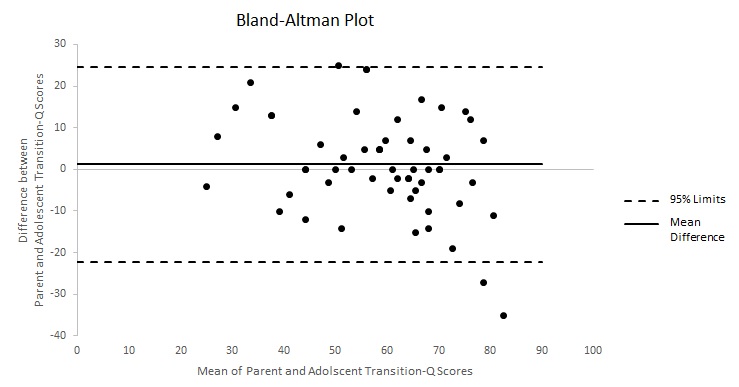Session Information
Date: Tuesday, November 9, 2021
Title: Pediatric Rheumatology – Clinical Poster III: Miscellaneous Rheumatic Disease (1614–1644)
Session Type: Poster Session D
Session Time: 8:30AM-10:30AM
Background/Purpose: The transition from pediatric to adult rheumatology care is associated with increased disease activity and morbidity. The parent-child relationship is a significant relationship in the transition journey and parents play a key role in promoting self-management skills in adolescent patients. Assessing both adolescents’ and parents’ perception of the adolescent’s independence and self-management skills are important to identifying discordant views and developing strategies to improve transition. Thus, we compared transition readiness assessment scales from both perspectives and analyzed their level of agreement.
Methods: Adolescents aged 14-18 years old with JIA or jSLE and their parents were recruited in our multidisciplinary rheumatology transition clinic. The patient and one parent both independently completed the TRANSITION-Q during clinic appointments. The TRANSITION-Q is a 14-item, validated, self-administered questionnaire assessing healthcare self-management skills where higher scores (max. 100) indicate greater transition readiness. Total scores and frequencies of responses to each question (“never”, “sometimes” or “always”) were recorded and the proportion of agreement between their responses were determined. Pearson correlation analyses determined the correlation between adolescent and parent total transition scores and agreement was analyzed using a Bland-Altman plot.
Results: Among 57 patient/parent dyads, the Pearson correlation coefficient between parents’ and adolescents’ total scores was 0.71 (p< 0.001). Bland-Altman analysis illustrated generally good agreement with a mean difference of 1.2 and no consistent bias between parent and adolescent scores. For each question, dyads agreed an average of 70% of the time. The majority of disagreement was mild (i.e. sometimes/always or sometimes/never). Most frequent disagreements pertained to adolescents’ discussion with people about their health condition and asking questions regarding their health. Extreme disagreements (i.e. always/never) were rare and only occurred 7% of the time in relation to whether adolescents contact the doctor when they need to, and 9% of the time in relation to seeing the doctor/nurse on their own.
Conclusion: Adolescents and parents generally agree on the level of the adolescent’s transition readiness, however there is occasional disagreement in specific domains. Identifying items more prone to disagreement can help identify areas to target future interventions to improve self-management skills in adolescent patients and successful transition to adult care.
 Figure 1: Correlation between parent and adolescent Transition-Q scores
Figure 1: Correlation between parent and adolescent Transition-Q scores
 Figure 2: Agreement between parent and adolescent Transition-Q scores illustrated by Bland-Altman plot
Figure 2: Agreement between parent and adolescent Transition-Q scores illustrated by Bland-Altman plot
To cite this abstract in AMA style:
Ma C, Dushnicky M, Talaat H, Thomas S, Beattie K, Cellucci T, Garner S, Heale L, Matsos M, Batthish M. Self-reported Transition Readiness of Adolescent Patients with Rheumatologic Disease: Do the Parents Agree? [abstract]. Arthritis Rheumatol. 2021; 73 (suppl 9). https://acrabstracts.org/abstract/self-reported-transition-readiness-of-adolescent-patients-with-rheumatologic-disease-do-the-parents-agree/. Accessed .« Back to ACR Convergence 2021
ACR Meeting Abstracts - https://acrabstracts.org/abstract/self-reported-transition-readiness-of-adolescent-patients-with-rheumatologic-disease-do-the-parents-agree/
